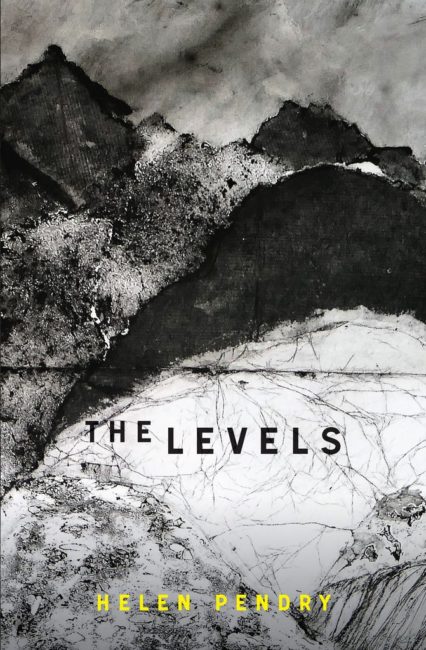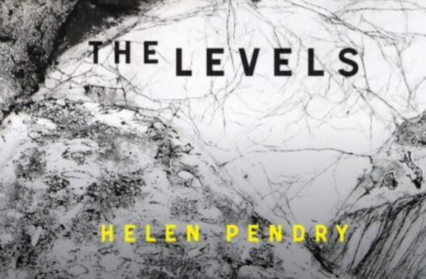Kirsti Bohata finds an impressive new literary voice in The Levels, the debut novel from Helen Pendry, published by Parthian Books.
Since Brexit, with its ambitions for ‘global Britain’, the word ‘global’ more than ever evokes an unaccountable flow of finance, based on extractive economics shored up by an international trade in arms. In The Levels, such networks are explored in microcosm in a mid-Wales landscape. Set amongst abandoned slate mines under a sky buzzed by warplanes and military drones, this is a place enmeshed in a long history of global industrial, capitalist, and imperialist violence.

This is a book that works on several levels – a cliché of book reviewing that suggested itself to me before I remembered the title. At one level, it’s a transection of Welsh history as etched into the layered landscape: agriculture, mining, silviculture (all those forestry commission trees planted against the next war), reservoirs, military training, and tourism with its attendant cultural erasure (welcome to ‘Sunny Hill Holiday Park’). But there is also a strong seam of resistance, buried just below the surface, or – in the case of Mr Ellis, the irascible farmer – displayed in stones in the shape of a dragon, laid out on his fields for the low-flying pilots to see.
If this all sounds a little too contrived, Helen Pendry carries it off exceptionally well, not least because on another level this novel is a slow-burn mystery. The plot revolves around a spiky, sometimes brittle, young woman as she searches for a vanished eccentric who has sent her a map and the key to his camper van parked up in a north Wales quarry. Some well-crafted, almost lyrical interludes suggest a gruesome fate early on:
He dreams of rising into the light, of floating along the path over the slate outfall and through the birch scrub to the stream. He dreams of passing the New Cottages and making his way along the forestry track to his campervan in the quarry. He watches himself set the red kettle on the hob and take out a notebook. He’s making notes on the Bryn Hyfryd mine. He’s making maps of its tunnels and shafts and inclines and adits.
He wakes up underground.
The quest – which is about the map-maker’s murky past as much as his fate – holds one’s attention, even as one is aware of other stories swirling in the depths.
Abby Hughes is a guarded, hostile and distant woman, whose various defences against violence and betrayal make her a difficult yet oddly likeable woman. Certainly she attracts those around her, forming a series of unlikely yet plausibly sketched relationships with the none-too-welcoming inhabitants of the tourist village of Pont Rhith where she lands, out of season, one bleak January. Her arrival and the awkward yet meaningful alliances she forges amongst the simmering rebels in the hills reminds me of the central character in Mary Jones’s Resistance. Published in 1985, Jones’s novel is long out of print; it features another woman out of her depth in a mid-Wales location populated by Welsh resistance fighters. Both are alternately attracted and repelled, fascinated and uncomprehending. Both novels have a lot to say about the state of Wales.
In The Levels, Pont Rhith (a name that suggests disguise and illusion) is being transformed by unsympathetic entrepreneurs with their caravan parks and cafes with English names. In the once industrialised hills above, the abandoned quarry village is being taken over by the military as a school to train soldiers (ours and anyone else who cares to pay) in mountain warfare. The whole place is patrolled by low-flying military aircraft – the remaining defiant farmer opining he makes more in compensation for the noise of the planes than he does in the wool from his sheep. These typically Welsh scenarios are connected to a disturbing international network of arms sales, mercenary training and other war profiteering. Complicity – accidental or deliberate – in this global cycle of violence is one unobtrusive but important thread which appears in some surprising guises. What might we allow to happen, what might we be prepared to do to resist?
At times the message is a little laboured, spelling out J.R. Jones’s lament about one’s country leaving you, for instance, and some heavy-handed metaphors about drinking black coffee and a fuck-off demeanour. But for the most part the writing is more subtle than this. In the closing days of the mine, the ‘stonemen’ extracted the column of slate that stabilised the level because it is ‘easy pickings’. Their ‘robbing the pillar’ from a mine in which so many had died was seen as their right, but it also evokes our present undermining of climate and biodiversity – pillars upon which rest our planet’s stability and inhabitability. This is an assured and nuanced work of fiction and marks Helen Pendry as an important new literary voice.
The Levels by Helen Pendry is available now from Parthian.











